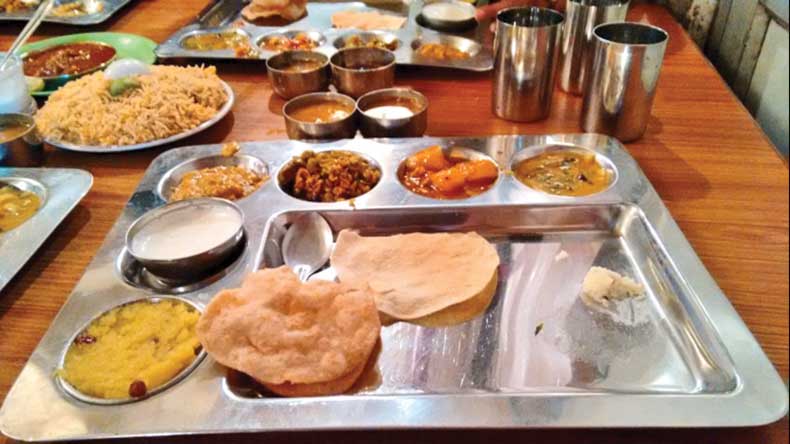The canteen of Andhra Bhawan is arguably the most popular amongst the bhawan canteens. It receives a large crowd everyday and sometimes even has a waiting list. The canteen boasts of a large seating area and the staff estimates that they serve around 300-400 people every day. The floor managers ensure that all visitors are accommodated comfortably. Once you are seated, the service will be prompt and you would immediately have the thali in front of you.
The thali costs Rs 120 and is unlimited except for the sweet. There is the well known South Indian combination of sambar and rasam. The two items present great contrast with the thick vegetable-infused sambar paired with the thin and light rasam. Both, however, are gently spiced. Along with these two, there is also the palak dal which would taste familiar to the dals we eat at home. This part of the menu is a permanent fixture on the thali. Then there are the two vegetable dishes which change every day. On our visit, we had dry carrot sabzi and stuffed brinjals. While the carrot dish was plain and without any special taste, the brinjals had a delicious and rich stuffing which made it delectable. But the most unique item on the thali is the chutney which is unlike any you would find in other restaurants. It is made from cabbage, green chillies, tomatoes and has onion pieces which adds a crunchiness to its tangy taste. Curd and salad are the accompaniments that round up the meal. Pooris and plain rice are both available to mop up your food with. The sweet component of the thali also varies every day and the deserts most regularly served are double ka meetha and pongal.
If you are not satisfied with the all-vegetarian fare of the thali and want a non-veg option, there are plenty of choices on the menu. The most popular among them are the chicken fry and mutton fry, dishes that the staff claims have become renowned way beyond the boundaries of the city.
The food, overall, is not very spicy and has a tanginess which distinguishes the cuisine of Andhra Pradesh. The service is prompt and you will get refills without much delay.
Apart from the thalis, the restaurant also offers snacks like pakoras and fritters made from various ingredients likemasoor dal and coral jasmine.
Gujarat Bhawan restaurant
The canteen in Gujarat Bhawan, is another popular destination. Unlike Andhra Bhawan, this canteen is not directly managed by the government but by a professional catering agency. As a result, the place feels more like a proper restaurant rather than a canteen. There are plenty of snacks available in breakfast including Gujarati favourites such as Khaman and Fafda. For a full meal you have the traditional Gujarati thali which costs Rs 140. You are first served a refreshing glass of chhas. Then arrives the thali containing two farsan (Gujarati snacks). The thali contains the delicious Gujarati dal which is sweet and infused with peanuts, Kathod (another type of dal made from whole lentils). The thali also includes two vegetables, one dry and the other in gravy. On our day of visit, Kathod was in the form of matar dal, a tasty yet underused lentil, which wasn’t sweet but was gently spiced using star anise, an ingredient rarely used separately in India. The two vegetables were good but without any distinction. The most delightful thing about the thali apart from the sweet dal were the thin phulkas, which you get straight off the tawa and generously smeared with ghee. There is one desert with thali which changes day-by-day but most often is fruit custard or mohan thal.
The thali is not extensive like the ones in fancier restaurants but provides a simple yet delicious and satisfying meal. Perhaps having one or two more authentic Gujarati delicacies would make the place more special.

Jakoi Restaurant, Assam Bhawan
At Assam Bhawan, the restaurant is a unit of Gateway Paradise, a company owning various restaurants in Assam, called Jakoi. The name of the restaurant means a traditional Assamese fishing net. It’s a posh restaurant that brings to light the great cuisine of the North-Eastern state which has been badly ignored so far. The restaurant boasts of an extensive menu covering all aspects of Assamese cuisine.
The best option for one looking for a wholesome experience of Assamese food is the thali. There are three types available in Jakoi and all are limited. The most basic among these is the vegetarian thali that costs Rs 309. Every dish on this thali is unique and distinctive. The overwhelming flavour of Assamese food is sour and it is hardly spicy. There is pitika(mashed potatoes seasoned with mustard oil), Mahor Bor Tenga (lentil pakoras in tangy and light curry), Dhoka curry (dal cube in curry) along with dal and a dry vegetable dish. There are two wonderful accompaniments with all this, a chutney made from tamarind and jaggery and Kharoli (dry mustard paste with mustard oil). The sweet dish is a simple rice kheer.
Apart from the thalis, the restaurant also boasts of snacks like pakoras and fritters made from various ingredients like masoor dal and Coral jasmine. There are a lot of authentic Assamese non-vegetarian dishes made from fish, duck and chicken. This includes Koloh chicken, which is cooked in a pot and Bhoot Jolokiya chicken made from the famous chilli found in Assam.
This place is costlier compared to other state bhawans but it provides a much needed introduction to the cuisine of Assam which deserves to be promoted and celebrated.

